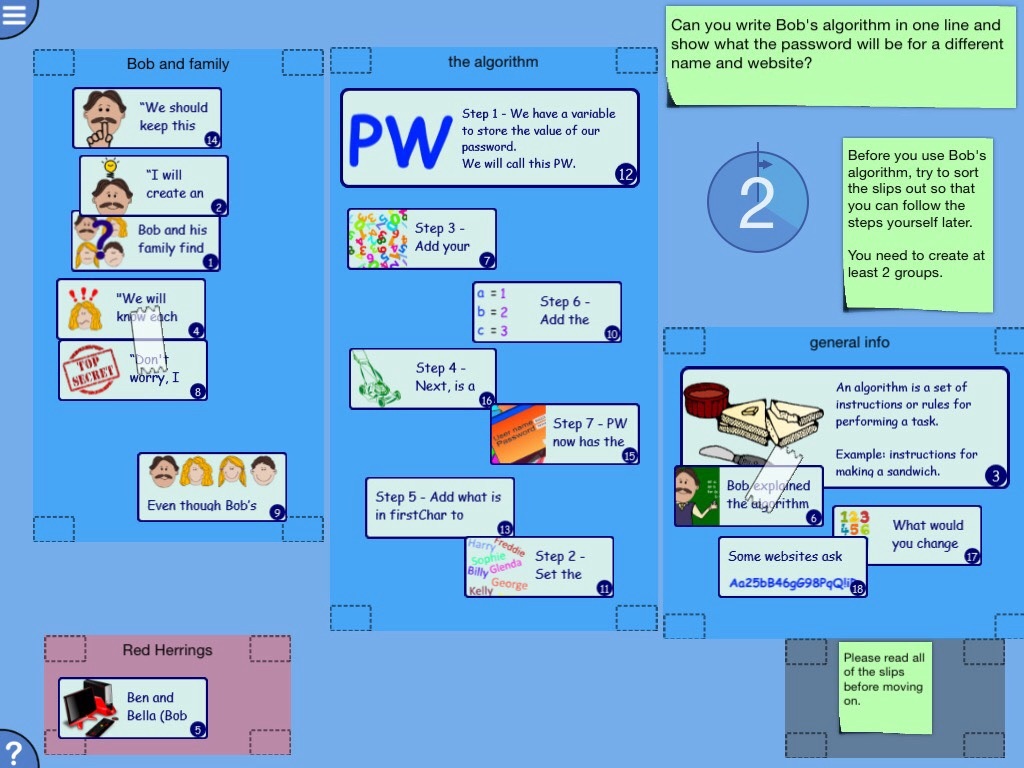
Bob's Algorithm (Computing) app for iPhone and iPad
Developer: Reflective Thinking
First release : 27 Mar 2015
App size: 29.8 Mb
Digital Mysteries: Bob’s Algorithm is a problem-solving app for 8-11 year olds that is unique in allowing pairs to work together on one iPad with a task mapped to computing curriculum topic ‘Use logical reasoning to explain how simple algorithms work’.
Users are given illustrated slips of information within the app which they read, organise into groups and lay out across the screen. These are all about a family who keep forgetting their passwords to things. They create/discuss a simple password generation algorithm to help them create their own unique passwords for each website. Through explaining how the algorithm works, students learn what an algorithm is by the apps story - basic use of variables and some simple logic.
To help users answer ‘Can you write Bobs algorithm in one line and show what the password will be for a different name and website?’ they have access to exciting tools once theyve read all the bits of information. This includes notes (to type their thoughts or calculations), normal sticky tapes (to stick slips/notes together with general links) and groups (to help organise slips) and in the final stage, arrow sticky tapes (to show a causal or chronological link). Once students complete the mystery, a PDF is generated detailing what they’ve done, which can be printed or shared. They can also go through a dedicated Reflection Stage to play back their session and discuss it.
The task can provide the opportunity to refresh students’ understanding of other areas in the earlier stages of the curriculum such as algorithms and variables while they apply logical reasoning skills to understand the behaviour of an algorithm and predict its output. The mystery also demonstrates to the students how the result of the same algorithm differs based on its initial state and its input variables.
Who is this app for?
This is most suited to 8-11 year olds. It has two difficulty levels. At the hard level, students are given two extra slips which help challenge them to think further about the topic. Five learning outcomes are suggested including ‘Use logical reasoning to understand how a simple algorithm works’. Sub-questions are provided which can help the teacher get the students to focus on certain elements.
What is different about Digital Mysteries?
• Truly collaborative: It is unique in that more than one student can interact with it at once
• Record of learning: Students interact with exciting technology then can share/print a PDF report of their session
• Reflection: Sessions are recorded so students can playback and discuss them, emphasising the importance of the process as well as the outcome
• Speaking and listening: Due to its collaborative nature, each session aligns to this learning goal plus group discussion and interaction
• Engagement: Working in pairs adds to the fun experience of problem-solving
• Research: Weve done years of academic research on how to make the most of touch screens for learning in general, and collaboration specifically
What does a mystery consist of?
• Illustrated slips of information: Short snippets to help students with reading
• Questions: One main question plus optional sub questions to maximise collaboration, discussion and expression of ideas
• Extras: Most tasks come with hints for those who need them, e.g. suggestions for organising ideas or simpler stage introductions to ease them in
• Description: This gives teachers the information they need to plan; including the curriculum point each task links to, the advised age range and possible learning outcomes
How can I try other mysteries?
At the bottom of the app details tab, tap Developer Apps to view our current range.



